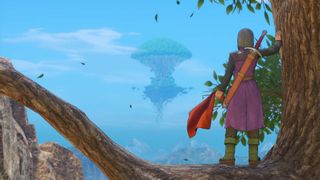Dragon Quest 11 marks a major milestone for Japanese PC gaming
After three decades, a series inspired by western computer RPGs finally arrives on PC.

When I say that the release of Dragon Quest 11 on PC on September 4th is a moment 37 years in the making, I'm only being a little dramatic. Whether it flops or becomes a massive success, Dragon Quest 11 existing as a PC game is significant. It has meaning beyond the ability to play Dragon Quest on a monitor instead of a TV, with a keyboard instead of a gamepad.
For so long, Dragon Quest's success in America has mirrored PC gaming's success in Japan.
It's an event that matters because for so long, Dragon Quest's success in America has mirrored PC gaming's success in Japan: neither, for one reason or another, ever really managed to break out. And it matters for the simple reason that everyone loves a story coming full circle, and Dragon Quest's story starts in 1981, with an American computer game named Wizardry.
As we wrote in The forgotten origins of JRPGs on the PC, Dragon Quest wouldn't have existed without the inspiration of Wizardry, one of the first RPGs you could play on an Apple II rather than a terminal and a mainframe. Dragon Quest's creator Yuji Horii was further influenced by 1983's Ultima, but took those complex PC RPGs and made something simpler, less daunting and more story-driven on the Famicom. At that point in the 80s, RPGs developed for Japan's native computers like the PC-88 and the MSX were genuinely popular, but as the console RPG's star rose, fueled by Dragon Quest and Final Fantasy and hundreds more, gaming shifted more and more to Nintendos and eventually PlayStations.

Japan's native PC hardware struggled in the 90s, and western PCs never really took their place. For years, the general wisdom was that Japanese computers were the domain of porn games and homebrew doujin fan games. But Dragon Quest… everyone knew Dragon Quest. Horii and his team transplanted those PC roots to consoles and nurtured them, with each game adding thoughtful new systems that may seem quaint today because they've been copied so many times since. Dragon Quest might as well be the generic trademark for RPGs in Japan, the way we say Kleenex instead of tissue, or your parents might still say Nintendo when they simply mean videogames.
The depth and breadth of Dragon Quest's ubiquity comes through vividly in this commercial Square Enix released for the game in Japan last year; you don't have to speak a word of Japanese to get it and feel a wave of nostalgia for a childhood you didn't live.
The emotion resonates, but the reality is that Dragon Quest never experienced the success of Final Fantasy or Pokemon in the west. I can't really tell you why, though the go-to explanations are that Dragon Quest remained quiet and comfortable while Final Fantasy got bigger and more bombastic, and that the marketing in the west has never done the games any favors.
As Final Fantasy productions grew more lavish and more tuned to western sensibilities, they also became multiplatform games to support their rising budgets. And in just the past five years, Square Enix has discovered that the PC has an audience of players who will gladly buy Final Fantasy 6 or 7 all over again, or play Final Fantasy 15 with a pile of weird mods. Nearly every game in the numbered series is now on PC, where they'll remain playable more or less forever, long after new consoles break compatibility.
The biggest gaming news, reviews and hardware deals
Keep up to date with the most important stories and the best deals, as picked by the PC Gamer team.
It's possible that a few years from now, Dragon Quest will be in that same place. Thanks to the enormous success of games like Dark Souls forging the way, Japanese companies have fully awakened to the fact that there's a hungry audience for their games on PC. More surprisingly, Steam's use in Japan has also grown considerably: in September 2014, Japanese PC gamers ran through a petabyte of data. In 2018, that number has quadrupled to four petabytes.
Today it's almost more surprising when a major Japanese game isn't coming to PC alongside consoles, and their games keep setting records on PC. But as Sega and Square Enix and Capcom have filled out their back catalogs with Steam ports of their classic games, Dragon Quest has been a blatant omission, a lingering callback to the old thinking that Japanese RPGs just won't sell. That outside Japan, the audience just isn't there.
I hope Dragon Quest 11 strikes that idea down like a bolt of lightning. In the 80s, early computer RPGs from America directly inspired the birth of Japan's own RPG genre, and it seems only fitting for Dragon Quest to mark the moment the genre fully embraced its PC heritage.
37 years after Yuji Horii saw Wizardry running on an Apple II, one of his games will appear on the PC in the west for the first time. Whether it's a thud or a modest hit or the first note of a triumphant western crescendo for Dragon Quest, I think it's fair to say: it's about damn time.

Wes has been covering games and hardware for more than 10 years, first at tech sites like The Wirecutter and Tested before joining the PC Gamer team in 2014. Wes plays a little bit of everything, but he'll always jump at the chance to cover emulation and Japanese games.
When he's not obsessively optimizing and re-optimizing a tangle of conveyor belts in Satisfactory (it's really becoming a problem), he's probably playing a 20-year-old Final Fantasy or some opaque ASCII roguelike. With a focus on writing and editing features, he seeks out personal stories and in-depth histories from the corners of PC gaming and its niche communities. 50% pizza by volume (deep dish, to be specific).
Most Popular


